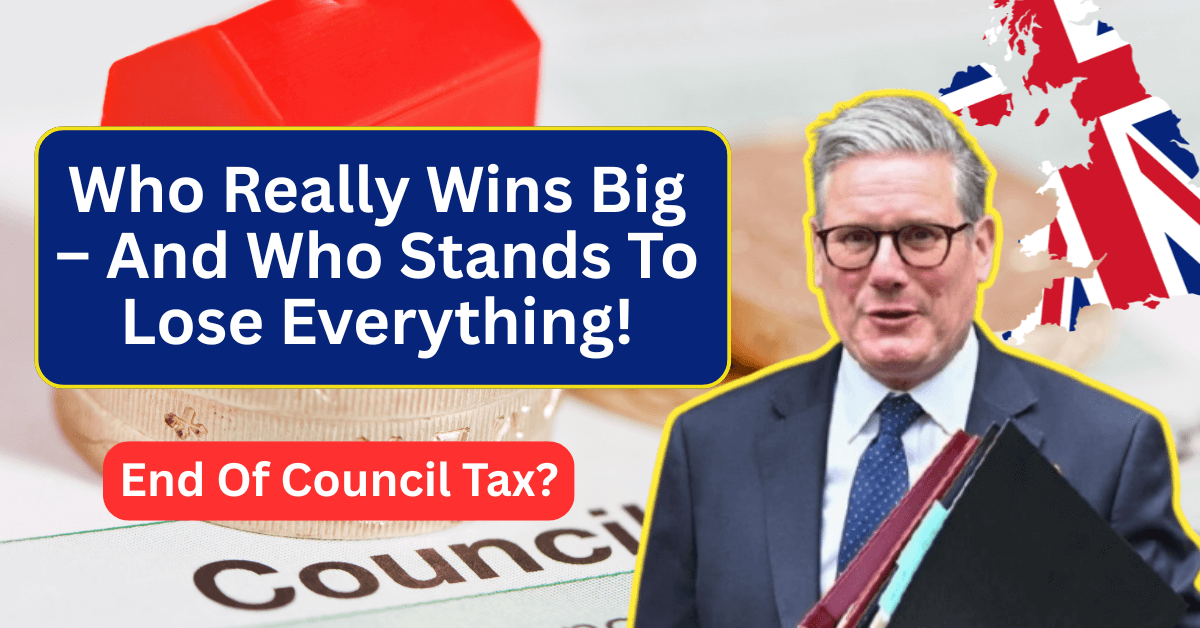The debate around council tax in the UK has intensified in 2025. For decades, council tax has been a controversial subject—criticised for being outdated, unfair, and burdensome on households with lower or fixed incomes. But now, fresh proposals and rumours about scrapping or drastically reforming council tax are sparking strong reactions.
For some, the end of council tax could mean significant financial relief. For others, it raises questions about how local services will be funded. So, who really wins, and who could stand to lose everything if council tax as we know it disappears? Let’s break it down.
What Is Council Tax and Why Is It So Controversial?
Council tax is a local tax charged on households in England, Scotland, and Wales, based on property valuation bands from 1991.
It funds essential services such as:
- Rubbish collection
- Local schools
- Social care
- Street lighting
- Policing and fire services
The controversy arises because:
- It’s based on outdated property values.
- Lower-income households often pay a higher percentage of their income compared to wealthier households.
- Pensioners and single residents sometimes struggle to cover the rising costs.
Why Are People Talking About the End of Council Tax in 2025?
Several local councils are on the brink of bankruptcy. This has forced the government to consider radical tax reforms.
The main reasons are:
- Council budgets are stretched thin.
- Rising social care costs for ageing populations.
- Calls for a fairer taxation system tied to income, not property value.
This year, new debates around replacing council tax with a proportional property or income-based tax have gained momentum.
What Could Replace Council Tax?
While nothing is final, three major proposals are circulating:
- Local Income Tax – Residents pay based on income, not property value.
- Land Value Tax – Tax based on the value of the land, not the buildings on it.
- Council Tax Rebanding – Updating property bands to reflect current market values.
Each option comes with winners and losers.
Who Really Wins If Council Tax Ends?
The biggest winners would likely be:
- Pensioners on fixed incomes: Many pensioners living in high-value homes but with low pensions struggle with council tax. A change could reduce their burden.
- Low-income households: Those currently paying a disproportionate share relative to their earnings may benefit under an income-based system.
- Renters: Although landlords typically pay council tax, costs are often passed on through rent. A fairer system could lower the pressure on tenants.
Who Stands To Lose Everything?
If council tax disappears, others may face higher bills or service cuts:
- High-income earners: Under a local income tax, wealthier individuals could pay far more than they do now.
- Owners of expensive properties: If a land value tax is introduced, those with large or valuable properties may face steeper charges.
- Households in wealthy areas: They may lose the advantage of relatively low council tax compared to property value.
What About Local Councils?
Local councils are deeply dependent on council tax revenue. If it’s scrapped without a robust replacement:
- Councils may face funding gaps.
- Services like bin collection, libraries, and care homes could be slashed.
- Some councils may become even more financially unstable.
This raises a tough question: will services deteriorate, or will taxes simply rise in another form?
How Would This Impact Pensioners?
Pensioners are at the heart of this debate. Many live in properties that have soared in value but are cash-poor.
A pensioner in a £500,000 home may currently pay the same council tax as someone with a much higher income in the same band. If the system changes:
- Pensioners could save hundreds of pounds annually.
- Alternatively, if land value tax is applied, they may pay even more unless exemptions are created.
Could This Really Mean the End of Council Tax?
Experts suggest a complete end is unlikely, but major reforms are almost certain in the next five years.
Why?
- The current model is unsustainable.
- Political pressure is mounting.
- Fairer systems are being trialled in other countries, inspiring UK reform debates.
The Hidden Risks Nobody Talks About
Scrapping council tax could cause ripple effects:
- Housing market shock: Buyers may reconsider expensive homes if local taxes rise.
- Rural vs. urban divide: Rural households may end up paying more if income-based taxation favours urban workers.
- Service cuts: If tax collection becomes unstable, everyday services could vanish.
Public Reaction to Council Tax Reform
Surveys in 2025 show:
- 62% of people believe council tax is unfair.
- 48% support replacing it with an income-based system.
- 30% fear losing key local services if changes aren’t carefully managed.
Final Verdict – Who Wins and Who Loses?
- Winners: Low-income earners, renters, and pensioners may gain the most relief.
- Losers: High-income professionals, owners of large properties, and councils reliant on predictable funding could lose out.
The reality? Reform is coming. But whether it’s the end of council tax or just a reshuffle, the balance of winners and losers will depend on the government’s choices.
